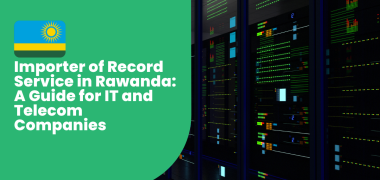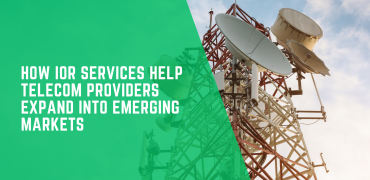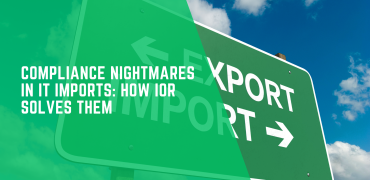Rwanda, known for its rapid economic growth and progressive policies, has become an attractive destination for IT and telecom companies looking to expand their operations in Africa. However, navigating the import regulations and compliance requirements can be challenging, especially for companies unfamiliar with the local landscape. This guide provides a comprehensive overview of Importer of Record (IOR) services in Rwanda, tailored specifically for IT and telecom companies.
Understanding the Importer of Record (IOR)
The Importer of Record (IOR) is a legal entity responsible for ensuring that imported goods comply with all local laws and regulations. This includes handling customs documentation, paying duties and taxes, and ensuring that the imported goods meet all regulatory requirements. For IT and telecom companies, this role is crucial in mitigating risks and ensuring smooth import operations.
Why IT and Telecom Companies Need IOR Services in Rwanda
IT and telecom companies often deal with complex and high-value equipment that requires specialized knowledge and handling. The regulatory landscape in Rwanda, while business-friendly, has specific requirements that must be met to ensure compliance. Utilizing an IOR service helps streamline the import process, reduces risks, and ensures that all legal obligations are met.
Key Components of IOR Services
1. Customs Compliance
Customs compliance is a critical component of IOR services. The IOR ensures that all necessary documentation is accurately prepared and submitted, including:
- Commercial Invoice: Detailing the value, quantity, and description of the goods.
- Bill of Lading: Providing proof of shipment and details about the goods.
- Import Permits and Licenses: Depending on the nature of the goods, specific permits or licenses may be required.
- Product Certifications: Ensuring that the imported goods meet local standards and regulations.
2. Payment of Duties and Taxes
The IOR is responsible for calculating and paying all applicable duties and taxes. This includes:
- Customs Duties: Levied on the imported goods based on their classification and value.
- Value-Added Tax (VAT): Applied to the cost of the goods, customs duties, and any additional fees.
- Other Taxes and Fees: Depending on the goods and their use, additional taxes or fees may apply.
3. Regulatory Compliance
Ensuring that all imported goods comply with local regulations is crucial. For IT and telecom companies, this might include:
- Telecommunications Regulations: Ensuring that all equipment meets Rwanda Utilities Regulatory Authority (RURA) standards.
- Safety and Environmental Standards: Compliance with safety and environmental regulations to avoid penalties and ensure the safe use of equipment.
- Data Protection and Cybersecurity: Adhering to local data protection laws and cybersecurity requirements.
4. Logistics and Transportation
IOR services often include logistics and transportation support, ensuring that goods are transported safely and efficiently from the port of entry to their final destination. This includes:
- Freight Forwarding: Coordinating the shipment of goods from the country of origin to Rwanda.
- Warehousing and Storage: Providing temporary storage solutions if needed.
- Distribution: Ensuring timely delivery to the final destination.
Benefits of Using IOR Services for IT and Telecom Companies
1. Streamlined Import Process
IOR services simplify the import process by handling all aspects of customs compliance, documentation, and regulatory requirements. This allows IT and telecom companies to focus on their core operations without worrying about the complexities of importation.
2. Risk Mitigation
Using an experienced IOR reduces the risk of non-compliance, which can result in severe penalties, fines, and delays. The IOR ensures that all regulatory requirements are met, minimizing the risk of issues arising during the import process.
3. Cost Efficiency
While there is a cost associated with IOR services, it can ultimately save money by preventing delays, fines, and other unexpected expenses. Additionally, IORs can leverage their expertise to find cost-effective solutions for transportation and logistics.
4. Expert Knowledge
IORs have specialized knowledge of local regulations and requirements, which can be particularly beneficial for IT and telecom companies dealing with complex equipment and technology. This expertise ensures that all necessary steps are taken to comply with local laws.
Choosing an IOR Service Provider in Rwanda
When selecting an IOR service provider in Rwanda, consider the following factors:
1. Experience and Expertise
Choose a provider with extensive experience in handling IT and telecom equipment. They should have a deep understanding of the specific regulatory requirements for these industries.
2. Reputation
Look for a provider with a strong reputation and positive reviews from other businesses in the industry. This can provide assurance that they deliver reliable and high-quality services.
3. Range of Services
Ensure that the IOR offers a comprehensive range of services, including customs compliance, logistics, regulatory compliance, and more. A one-stop solution can simplify the process and reduce the need for multiple service providers.
4. Local Knowledge
A provider with local knowledge and connections can navigate the regulatory landscape more effectively, ensuring smoother import operations.
5. Cost Transparency
Choose a provider that offers transparent pricing and clearly outlines all costs involved. This can help avoid unexpected expenses and ensure better budget management.
Steps to Engage an IOR Service Provider
1. Initial Consultation
Begin with an initial consultation to discuss your specific needs and requirements. The provider should offer insights into the import process and explain how they can assist.
2. Customized Solutions
Work with the provider to develop a customized solution tailored to your business needs. This may include specific compliance measures, logistics arrangements, and other services.
3. Agreement and Contract
Once the details are finalized, enter into an agreement or contract with the IOR service provider. Ensure that all terms and conditions are clearly outlined, including responsibilities, costs, and timelines.
4. Implementation
The IOR will begin handling the import process, including documentation, compliance, logistics, and more. Regular communication and updates are essential to ensure everything proceeds smoothly.
5. Ongoing Support
A good IOR service provider will offer ongoing support and assistance, addressing any issues that arise and ensuring continuous compliance with local regulations.
Challenges and Considerations
While IOR services offer significant benefits, there are also challenges and considerations to keep in mind:
1. Complex Regulations
Rwanda’s regulatory environment can be complex, especially for specialized equipment. Ensure that your IOR provider has a thorough understanding of all relevant regulations.
2. Costs
IOR services come with costs, and it’s essential to weigh these against the benefits. Consider the potential savings from avoiding penalties and delays when evaluating the overall cost.
3. Reliability
Choose a reliable provider with a proven track record. Delays or errors in the import process can have significant impacts on your operations.
4. Communication
Effective communication is crucial. Ensure that your IOR provider maintains regular contact and provides updates on the import process.
Conclusion
For IT and telecom companies looking to expand their operations in Rwanda, understanding and navigating the import process is crucial. Importer of Record services offer a valuable solution, ensuring compliance with local regulations, managing logistics, and mitigating risks. By choosing the right IOR service provider and leveraging their expertise, companies can streamline their import operations, reduce costs, and focus on their core business activities. Rwanda’s growing economy and business-friendly environment present significant opportunities, and with the right support, IT and telecom companies can successfully tap into this vibrant market.




